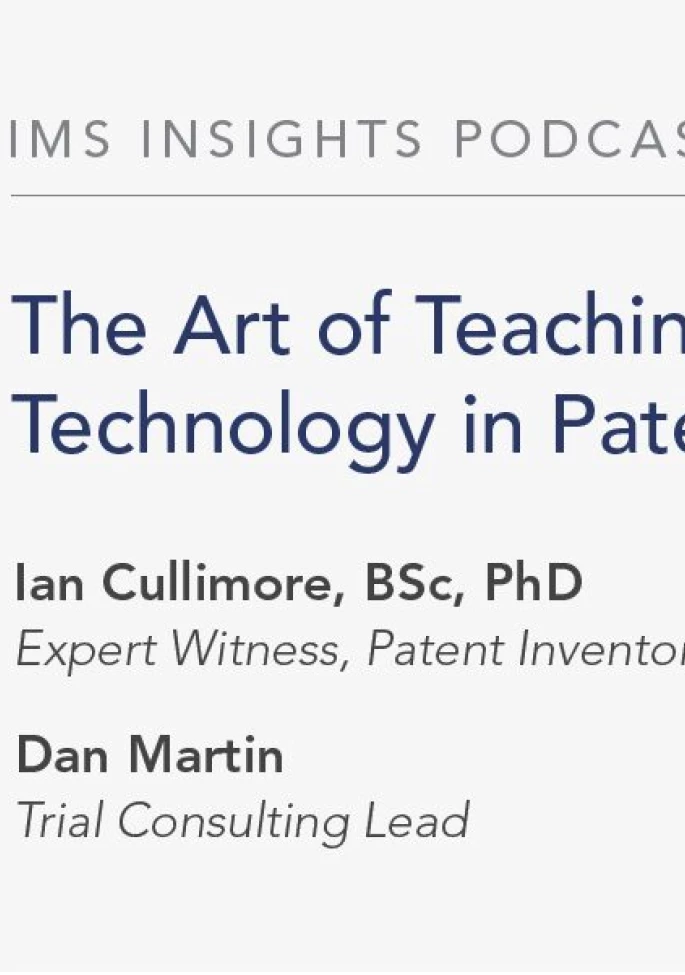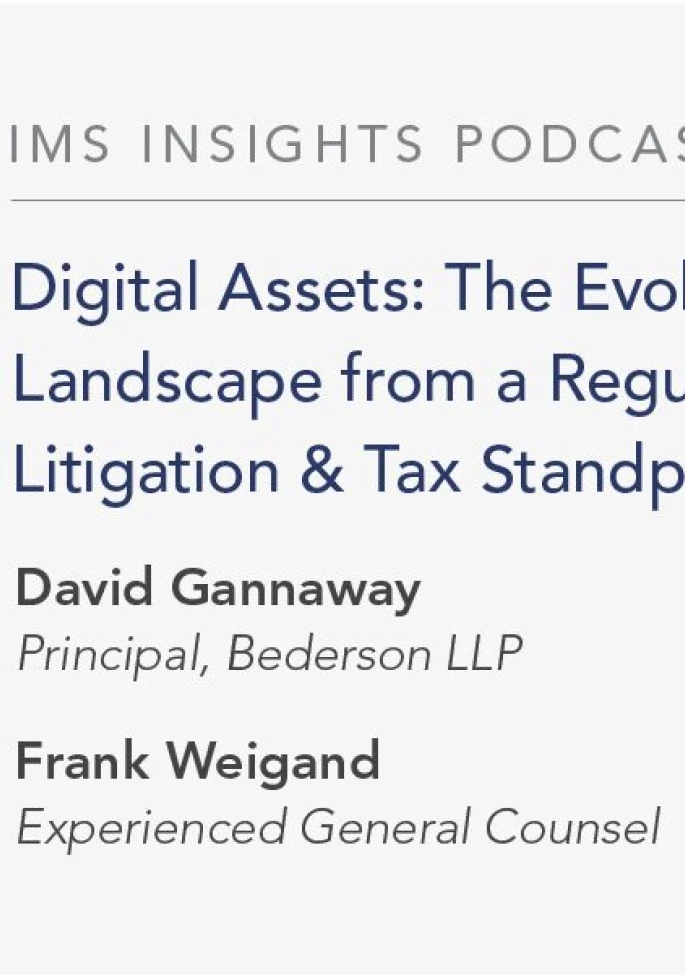In this episode of the IMS Insights Podcast, we speak with Dr. Edwin Hernandez about how trends in cloud computing, artificial intelligence (AI), and the Internet of Things (IoT) are shaping today’s global business and health response to COVID-19 and forging a new generation of antitrust issues.
Dr. Hernandez has been retained for IMS clients on several matters. He holds a doctorate degree in computer engineering, specializing in wireless communication, as well as a master’s degree in electrical and computer engineering from the University of Florida. Dr. Hernandez has expertise in several areas including wireless networking and communication, personal area networking, multimedia streaming, blockchain, mobile devices and systems, smartphones and wearables, and wireless embedded software development.
He is an avid entrepreneur and inventor, with over 20 years of industry experience both with startups and in high-tech corporations including Microsoft and Motorola. Hernandez is named inventor on 11 U.S. Patents, three of which are licensed by a major internet and communications company to manufacture millions of cellular devices. He is also a reviewer for several journals and international conferences, a speaker and panelist, and a judge at startup forums.
Teresa Barber: Could you explain: what is cloud computing?
Edwin Hernandez: Well, cloud computing is nothing new. It’s a basically a concept that it was brought because of something called virtualization. So virtualization basically enables the use of any hardware with any software before you would do web hosting or just hosting. And then basically the bare metal, the computer was running with the software simultaneously, and then you couldn't disconnect the two. You have to like move the computer with the software or do like a migration, so was hard to do.
Edwin: So what they did is created this layer of virtualization where they virtualized the computer and then when they create a virtualization layer, then they started creating the voice called clouds. So they will put us in computers, virtual computers now in the same hardware, and then they will be able to migrate the computers from one to another one without having to actually move the harder work.
Edwin: So when they approached in this direction, then it started becoming the cloud because now people that start seeing that they core runs the services virtually as opposed to want to serve in their own premise. So then it was a transition to move this stuff on premise that it was tied to hardware and the software. Now you could run the software basically in any hardware and that could be remote, that could be somewhere else in the 'cloud.'
Teresa: Edwin, can you tell us how has cloud enabling applications and artificial intelligence and internet of things?
Edwin: Yeah, so now that everything is running on the cloud, so is called a now on all IP network. So then basically what happens is as computers became virtualized and run in the virtual environment, then also the network became virtualized and runs in the virtual environment. So as the network becomes virtualized and then you can execute basically anything in this cloud base, a computer system, artificial intelligence is nothing but another instance in the cloud.
Edwin: So now you can enable artificial intelligence, internet of things actually was a similar version so you can execute virtually anything. So you can have a sensor that just is the hardware and then the intelligence recites 'in the cloud' where the things that actually are executed. So now you can have all this data that comes from all the sensors being analyzed by an artificial intelligence engine that runs precisely in the same environment where your web server is running, where your applications are running because it's all virtualized network, cloud, IoT, artificial intelligence, all in one bundle.
Teresa: Interesting. Are you seeing any particular industries or any sectors that you're watching that really seem like they're poised to take advantage of cloud, of IoT, this next generation, a really advanced innovation in these areas?
Edwin: Yeah, I know many, many areas are taking advantage of this transformation. Particularly I think healthcare is moving very rapidly into this direction. Television for example, that is being run as a hardware device right now as a broadcast in system is the last one to be adopted in the cloud. I think the next generation television for example, is a new standard that is going to be taken to effect.
Edwin: So actually compete with the current technologies for streaming that really have a lot to the cloud. So now like a cable television as well as moving everything into the cloud, healthcare technologies basically the entire financial system is moving everything into the cloud. Now is going to be a matter of time to see what industry is not moving into the cloud. I will say maybe the only one that it would be left out would be maybe corporations that are completely with lace assistance systems from the past. That may not move because of overload. Maybe they need to redo the entire system, but at one point I think even them, they will have to move into the cloud.
Teresa: Yeah, interesting. Well, and so we're talking now towards the end of February... The beginning of February, end of January, and 2020 and the novel coronavirus major epidemic very large event in mainland China and spreading to different countries. And we're watching this global response. And the medical and the scientific community working collaboratively to race towards vaccines.
Teresa: And then you think back to the early 2000s with the SARS epidemic and you mentioned healthcare. So I wanted to make that connection to public health and the scientific community. How is the infrastructure today? How is something like the advancement of cloud technology and data sharing, how is that enabling perhaps a different type of response from the scientific community and the medical community to something like novel corona versus SARS in the early 2000s?
Edwin: Well, yeah, so now that the data is now available everywhere, so I think like a healthcare can take advantage of this data and mine it using technologies like big data and data analysis to establish patterns that are unusual. For example, there's a spread of multiple diseases in one area of the world and that is spread basically is tied to this virus for example. So it will be an easy algorithm or computer software to say, okay, whatever is moving out of this area, then it's a suspicious transmitter of a disease.
Edwin: So then you could actually block airports, do more scrutiny on passengers and narrow down and hone down the source and determine what's the source is at the same time that diseases now that can be simulated. Most of the vaccines right now are being assimilated. There's a company out of a Chile that made an artificial intelligence algorithm to compute a new form of milk. So now this company, I believe is called... I cannot remember the exact name, but they were able to create a new artificial intelligent base milk that it received some good investment from venture capital from Silicon Valley.
Edwin: So they give you like, okay the cloud is merging with the creativity factor because now you can run these computations in thousands of different entities and instances simultaneously and determine what's the best outcome for either narrowing down, okay where's the source of this disease? Or maybe try to simulate a potential vaccine or a potential pharmaceutical or like in this particular example I just may recreate a new flu.
Teresa: Potentially a game changer. Really interesting. And the other area that I wanted to just ask you about are if you're watching some of the antitrust discussions around data sharing and we've looked at Amazon facing increased scrutiny from antitrust regulators. What would you, if you were going to provide guidance to general counsel or private practice litigators, what would you say they should be watching for? As we think about where does antitrust play in these new arenas?
Edwin: Yeah, no, so the matter with Amazon I think is that they have so much control on technology. So it even you'd be just to the particular, let's say data structure that let's say I have a company that creates a new type of book for example, that is maybe let's make an imaginary example, a three dimensional book and they have some patents on that. Something might be some technologies, but maybe I have not a well-defined marketing strategy.
Edwin: Amazon could for example, determine what is a target market is that I'm addressing without even entering into any or my computers, reading any of our hard drives. Just by looking at the patterns that my computer is on my servers running on the Amazon cloud generate. So they can say, "Okay, that company's creating a three dimensional book. We don't have to do the three-dimensional book. Why don't we figure out what they do. And then based on the patterns that they utilize for market analysis or validation or certain elements, then we can try to invest our money on their own engineering talent to recreate that product."
Edwin: So that creates a little advantage towards regulatory problems because we don't really know what information or what data is being used by Amazon or by other corporations that are potentially being not that competitive in terms of creating a fair market place. And that actually comes back to pricing, for example. So my Amazon could dump the prices of different particular articles just and maybe even try to subsidize them or tried to maintain certain type of low margin or high margin or depending on what they were trying to do in order to disrupt that particular competitor.
Edwin: And those practices that are going to be very hard to detect, number one. And second of all, they will be very harder to bring to court because of the difficulties in accessing the data and most likely even making a good report that's going to be hard to show that.
Teresa: Interesting. Sounds like a challenge.






